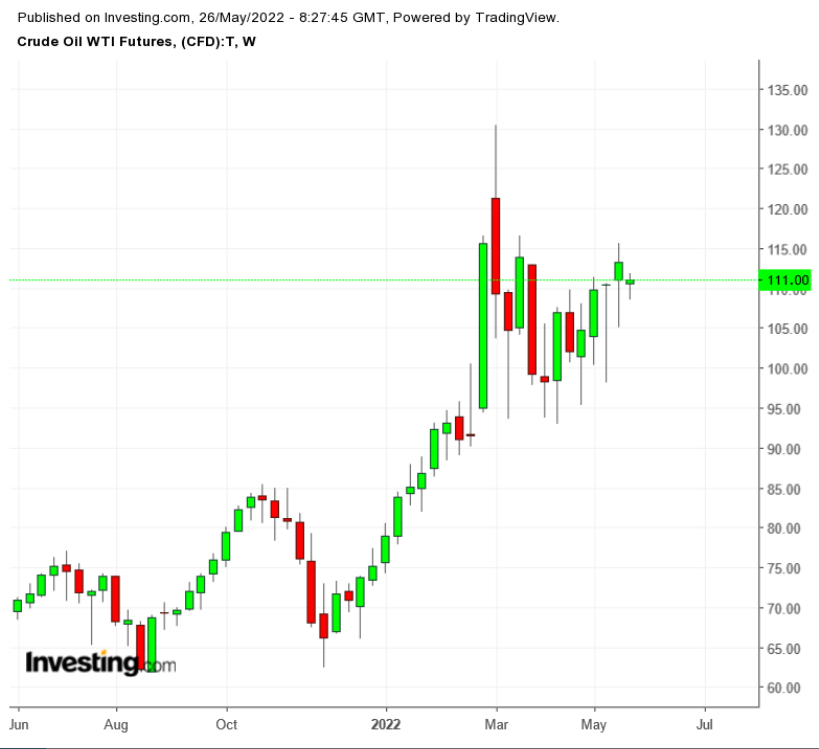It's not currently clear if the US is already in recession or if there will be a domestic or global recession going forward. But as talk of the possibility increases, traders need to be prepared for what this could mean for oil prices.

Opinions vary on when or if a recession is on the way. JPMorgan Chase CEO Jamie Dimon sees a real possibility it could happen, particularly if the Federal Reserve continues to raise interest rates. In Dimon's view, there's a one in three chance of a “mild” recession lasting six to nine months, but he says, there’s also “a chance it's going to be much harder than that.”
Former Federal Reserve chair and Princeton professor Alan Blinder says a recession is “pretty likely,” and by that he means, “maybe 50 to 60% probability.”
There is much discussion these days about how high oil prices increase the likelihood of an economic recession, but less conversation about what we can expect to happen to oil prices if a global recession ensues. Economist Kevin L. Klieson of the Federal Reserve Bank of St. Louis wrote in 2001 that during the early post-World War II period, cycles of economic contraction were not preceded by high oil prices. In the four quarters preceding the contractions of 1948-49, 1953-54, 1957-58, 1960-61, and 1969-70, relative energy prices only increased by about 1.5%, on average.
Since the early 1970s, however, energy prices increased an average of 17.5% preceding economic recessions. Keep in mind, this period corresponds to a time when the United States was largely reliant on oil imports to meet demand growth. It also coincides with the emergence of OPEC as an important influencer of oil prices and the oil market.
High oil prices are often cited as the cause of a recession. More accurately though, high oil prices or an oil shock should be described as a catalyst or contributing factor for a recession. Rarely are oil prices alone the reason for a recession.
An economic recession is a multifaceted circumstance, and fuel prices alone do not cause it. However, OPEC and some of the larger oil producers like Saudi Arabia, have often claimed to avoid high oil prices because they've feared contributing to a global recession.
Of greater importance to oil traders is how a recession actually impacts the price of oil.
Recessionary Price Impacts
A recession could bring down oil prices rather dramatically. During the 2008 financial crisis and the “Great Recession” that followed, oil prices dropped from $134 per barrel in June to $39 per barrel by February 2009.
However, prices did not remain depressed for long, as OPEC implemented production cuts and government stimulus, along with fears of inflation, led to increased commodity buying. Oil prices tend to fall during recessions, unless there is something artificially propping them up, such as during the 1970s when OPEC was able to set the price of oil.
But today, OPEC does not engage in direct price setting. If there were a recession now, oil prices could be expected to drop because demand slipped as economic activity slowed and speculators became nervous.
It is unclear whether high inflation, high fuel prices, and slower economic activity will dampen consumer sentiment as early as this summer. According to GasBuddy’s annual summer travel survey, 58% of Americans plan to take a road trip this summer despite record-high gasoline prices.
Respondents were concerned about inflation and prices at the pump but said they would stick to their summer vacation plans. However, according to data from the EIA, gasoline demand is starting to “show signs of cracks” due to higher prices.
Excluding 2020, gasoline demand is at its lowest level for this time of year since 2013. It is currently 5% lower than last year. This data could indicate that consumers are changing their behavior due to current economic conditions, although it is too soon to tell whether this trend will persist into the summer.
A recession now or in the coming months would be an unprecedented situation in many ways. We are still recovering from more than two years of restrictions on trade and social activity.
Indeed, air travel still has not yet fully recovered to 2019 levels. The entire travel industry experienced a major dislocation.
A recession now would delay full recovery at best and perhaps ingrain a new baseline of lower levels of trade, less global movement, less general production. Still, most recessions are short-lived and precipitate strong recoveries. The 2008 financial crisis was a bit of an anomaly with an oddly shaped graph of a wide V. Yet even then, oil prices recovered quickly.
The question, though, is if a dip in oil prices would see a later rebound to current prices (above $100) or to that post-pandemic level we were accustomed to in 2021 (maybe about $80). That’s the biggest uncertainty.
